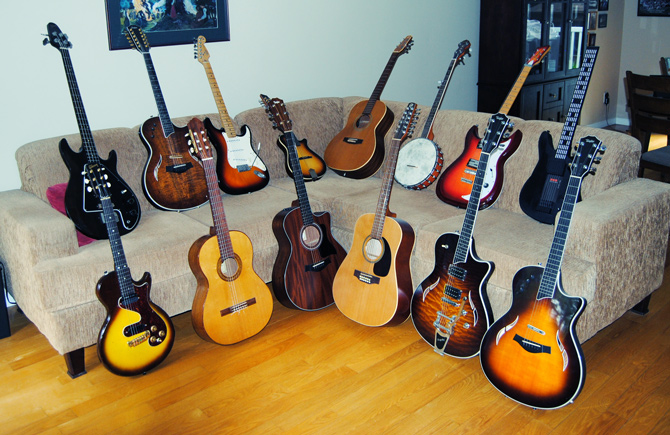In the mid 1950s, several intellectuals congregated to create their art in New York City’s Greenwich Village : its colleges, universities, book stores and coffee shops. The first were the storytellers, the beat poets who shaped their words to the cadence and rhythms of jazz, often reciting their poetry to the sound of an upright bass or a drum kit. The musicians followed and the instrument of choice was the acoustic guitar, usually fingerpicked. From this cultural hub, what came to be known as the folk revival spread across the United States.
I learned about the folk revival from Canadian television. Both CTV and CBC aired “Let’s Sing Out”, filmed on location from a different Canadian University each week. Several prominent artists were featured, including Simon & Garfunkel and Joni Mitchell, the pride of Saskatchewan. The American show “Hootenanny”, plagued by political differences between the producers and artists, only lasted two years but was rebroadcast on CBC. It was through “Hootenanny” that I learned about guitarists like Mississippi John Hurt (1892-1966), the Reverend Gary Davis (1896-1972) and Dave Van Ronk (1936-2002). Van Ronk was a pupil of the Reverend Gary Davis, who saw the guitar as a piano worn around the neck. Van Ronk took this pianistic approach and added the harmonic sophistications of Jelly Roll Morton and Duke Ellington. He also introduced the folk world to the complex harmonies of Kurt Weill.
I remember Van Ronk playing Scott Joplin’s “Maple Leaf Rag” and I couldn’t believe that such sophisticated piano music could be played on a guitar. I rushed out and eventually found a few guitar transcription books on the music of Scott Joplin (1868-1917). I still have these books to this day. Van Ronk was also a mentor to many artists who came to Greenwich Village from far and wide, most notably Bob Dylan and Joni Mitchell.
“Green Green Rocky Road” comes from the beat poet Bob Kaufman, who simply gave it to Van Ronk, who in turn completed it with the help of fellow folk musician Len Chandler. The song quickly became a fan favourite and Van Ronk’s signature piece for his entire career.
Bob (Robert Garnell) Kaufman (1925-1986) once famously said “I want to be anonymous. My ambition is to be completely forgotten.” I hope he will forgive me for disregarding his wishes but he is too important an artist to forget. A resident of San Francisco, Bob Kaufman founded and edited Beatitude, a magazine dedicated to poetry and the source of the word “beatnik”, which Kaufman coined. He usually didn’t write down his poems, and much of his published work survives by way of his wife Eileen, who wrote his poems down as he conceived them. He named one of his poetry books “Cranial Guitar”, a sublime concept. Kaufman often incurred the wrath of the San Francisco police simply for reciting his poetry in public. In 1959 alone, at the height of the beatnik era, he was arrested 39 times by the San Francisco police on disorderly charges (i.e., reading poetry in public).
In 1961, Kaufman was nominated for England’s Guinness Poetry Award, which was eventually won by T.S. Eliot. In 1963, he was arrested for walking on the grass of Washington Square Park in Greenwich Village. He was incarcerated on Rikers Island, then sent as a “behavioral problem” to Bellevue Psychiatric Hospital where he underwent electro-shock treatments that greatly affected his already bleak outlook on society. After the assassination of John F. Kennedy, Kaufman, a Buddhist, took a vow of silence which lasted 10 years.
Even though Bob Kaufman’s life was filled with a great deal of suffering, many will remember him for his wonderful idea that became the musical butterfly we know as “Green Green Rocky Road.”
Richard Séguin – voice and acoustic guitar
